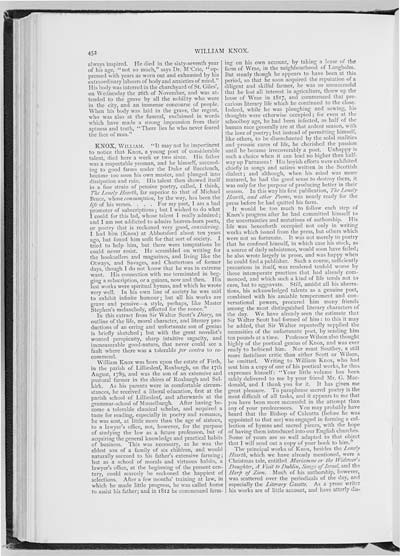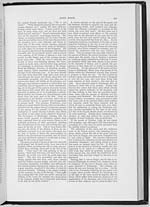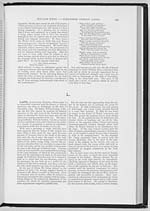452
always inspired. He died in the sixty-seventh year
of his age, "not so much," says Dr. M'Crie, "op-
pressed with years as worn out and exhausted by his
extraordinary labours of body and anxieties of mind."
His body was interred in the churchyard of St. Giles',
on Wednesday the 26th of November, and was at-
tended to the grave by all the nobility who were
in the city, and an immense concourse of people.
When his body was laid in the grave, the regent,
who was also at the funeral, exclaimed in words
which have made a strong impression from their
aptness and truth, "There lies he who never feared
the face of man."
KNOX, WILLIAM. "It may not be impertinent
to notice that Knox, a young poet of considerable
talent, died here a week or two since. His father
was a respectable yeoman, and he himself, succeed-
ing to good farms under the Duke of Buccleuch,
became too soon his own master, and plunged into
dissipation and ruin. His talent then showed itself
in a fine strain of pensive poetry, called, I think,
The Lonely Hearth, far superior to that of Michael
Bruce, whose consumption, by the way, has been the
life of his verses. . . . For my part, I am a bad
promoter of subscriptions; but I wished to do what
I could for this lad, whose talent I really admired;
and I am not addicted to admire heaven-born poets,
or poetry that is reckoned very good, considering.
I had him (Knox) at Abbotsford about ten years
ago, but found him unfit for that sort of society. I
tried to help him, but there were temptations he
could never resist. He scrambled on writing for
the booksellers and magazines, and living like the
Otways, and Savages, and Chattertons of former
days, though I do not know that he was in extreme
want. His connection with me terminated in beg-
ging a subscription, or a guinea, now and then. His
last works were spiritual hymns, and which he wrote
very well. In his own line of society he was said
to exhibit infinite humour; but all his works are
grave and pensive�a style, perhaps, like Master
Stephen's melancholy, affected for the nonce."
In this extract from Sir Walter Scott's Diary, an
outline of the life, moral character, and literary pro-
ductions of an erring and unfortunate son of genius
is briefly sketched; but with the great novelist's
wonted perspicuity, sharp intuitive sagacity, and
immeasurable good-nature, that never could see a
fault where there was a tolerable per contra to re-
commend.
William Knox was born upon the estate of Firth,
in the parish of Lilliesleaf, Roxburgh, on the 17th
August, 1789, and was the son of an extensive and
pastoral farmer in the shires of Roxburgh and Sel-
kirk. As his parents were in comfortable circum-
stances, he received a liberal education, first at the
parish school of Lilliesleaf, and afterwards at the
grammar-school of Musselburgh. After having be-
come a tolerable classical scholar, and acquired a
taste for reading, especially in poetry and romance,
he was sent, at little more than the age of sixteen,
to a lawyer's office, not, however, for the purpose
of studying the law as a future profession, but of
acquiring the general knowledge and practical habits
of business. This was necessary, as he was the
eldest son of a family of six children, and would
naturally succeed to his father's extensive farming;
but as a school of morals and virtuous habits, a
lawyer's office, at the beginning of the present cen-
tury, could scarcely be reckoned the happiest of
selections. After a few months' training at law, in
which he made little progress, he was called home
to assist his father; and in 1812 he commenced farm-
ing on his own account, by taking a lease of the
farm of Wrae, in the neighbourhood of Langholm.
But steady though he appears to have been at this
period, so that he soon acquired the reputation of a
diligent and skilful farmer, he was so unsuccessful
that he lost all interest in agriculture, threw up the
lease of Wrae in 1817, and commenced that pre-
carious literary life which he continued to the close.
Indeed, while he was ploughing and sowing, his
thoughts were otherwise occupied; for even at the
schoolboy age, he had been infected, as half of the
human race generally are at that ardent season, with
the love of poetry; but instead of permitting himself,
like others, to be disenchanted by the solid realities
and prosaic cares of life, he cherished the passion
until he became irrecoverably a poet. Unhappy is
such a choice when it can lead no higher than half-
way up Parnassus! His boyish efforts were exhibited
chiefly in songs and satires written in the Scottish
dialect; and although, when his mind was more
matured, he had the good sense to destroy them, it
was only for the purpose of producing better in their
season. In this way his first publication, The Lonely
Hearth, and other Poems, was nearly ready for the
press before he had quitted his farm.
It would be too much to follow each step of
Knox's progress after he had committed himself to
the uncertainties and mutations of authorship. His
life was henceforth occupied not only in writing
works which issued from the press, but others which
were not so fortunate. It was not merely to poetry
that he confined himself, in which case his stock, as
a source of daily subsistence, would soon have failed;
he also wrote largely in prose, and was happy when
he could find a publisher. Such a course, sufficiently
precarious in itself, was rendered tenfold worse by
those intemperate practices that had already com-
menced, and which such a kind of life tends not to
cure, but to aggravate. Still, amidst all his aberra-
tions, his acknowledged talents as a genuine poet,
combined with his amiable temperament and con-
versational powers, procured him many friends
among the most distinguished literary characters of
the day. We have already seen the estimate that
Sir Walter Scott had formed of him : to this it may
be added, that Sir Walter repeatedly supplied the
necessities of the unfortunate poet, by sending him
ten pounds at a time. Professor Wilson also thought
highly of the poetical genius of Knox, and was ever
ready to befriend him. Nor must Southey, a still
more fastidious critic than either Scott or Wilson,
be omitted. Writing to William Knox, who had
sent him a copy of one of his poetical works, he thus
expresses himself: "Your little volume has been
safely delivered to me by your friend Mr. G. Mac-
donald, and I thank you for it. It has given me
great pleasure. To paraphrase sacred poetry is the
most difficult of all tasks, and it appears to me that
you have been more successful in the attempt than
any of your predecessors. You may probably have
heard that the Bishop of Calcutta (before he was
appointed to that see) was engaged in forming a col-
lection of hymns and sacred pieces, with the hope
of having them introduced into our English churches.
Some of yours are so well adapted to that object
that I will send out a copy of your book to him."
The principal works of Knox, besides the Lonely
Hearth, which we have already mentioned, were a
Christmas tale, entitled Mariamne or the Widower's
Daughter, A Visit to Dublin, Songs of Israel, and the
Harp of Zion. Much of his authorship, however,
was scattered over the periodicals of the day, and
especially the Literary Gazette. As a prose writer
his works are of little account, and have utterly dis-

![]() Universal Viewer |
Universal Viewer | ![]() Mirador |
Large image | Transcription
Mirador |
Large image | Transcription
![]()

